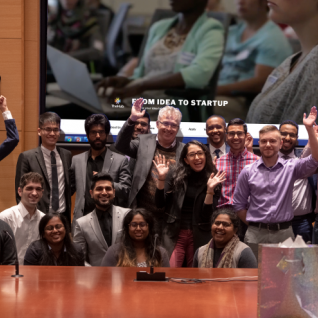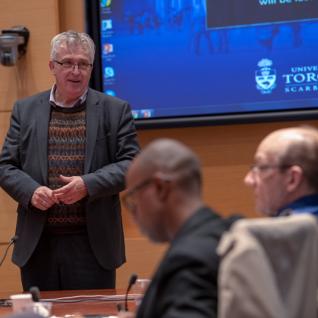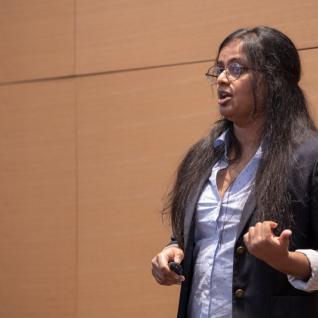The fourth annual UTSC Start-up event was a year of firsts for The Hub, U of T Scarborough’s entrepreneurial incubator.
It was the biggest cohort ever — 23 teams pitched their start-up ideas to a panel of judges in a Dragon’s Den-style opportunity to receive up to $7,000 each in funding. Pitches were judged based the idea, the team, market research, a business plan and quality of the presentation.
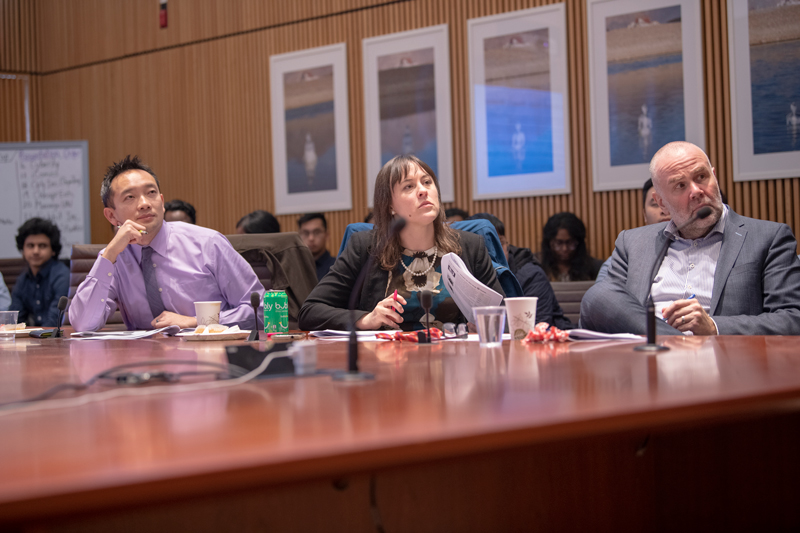
The wide range of start-up ideas included cannabis-infused chocolates, a new kind of backpack, an app for bodybuilders and a way to make money while playing video games.
“I thought everyone did a really great job and I was very happy and proud of how it went,” says Hub Director Gray Graffam. “All of these ideas are ones that we want to continue to work on and help.”
Indaggo
Melanie Ratnam, who graduated with her PhD only a few days before her pitch, placed first and took home $7,000 for her start-up, Indaggo.
In the past few years, Ratnam finished her PhD project with only a small budget to order lab supplies that she needed to complete her experiments.
Every dollar had to count. Ratnam spent upwards of 15 hours per week searching for the best deals and comparing prices. Her efforts paid off — she always found “incredible savings.”
“This led me to my aha moment, where I was like, ‘Is there an efficient way for all researchers to get the savings that I did?’” Ratnam told the judges.
In response, she created Indaggo, a platform to help researchers easily find deals and compare prices for lab supplies and other research materials.
“Our team is most excited about being able to save researchers time and money, with respect to purchasing lab supplies, so they can get back to doing what is most important — their research,” Ratnam says.
Illustrious Comics
Illustrious Comics, a start-up for independent comic books that pays authors more than any other hosting site — while being entirely free to use — received $2,500 in funding.
Saisujan Balachandran, Saeed Salar and Abdullah Razi are lifelong comic book fans, and even tried to publish their own comic books a few years ago.
“What differentiates comic book stories to me is the versatility,” Razi says. “Even if you have no text on a page, you can still feel emotional connections based on the panels, the colouring and the characters’ expressions.”
They found designing and printing was extremely expensive, and making money was almost impossible. As platforms like Marvel and DC bring comic books to the big screen – and the mainstream – Illustrious Comics is working to break into that market and through the monopoly.
“There’s thousands upon thousands of independent comic books and they’re really good books, but not enough people know about them,” Salar says.
In their pitch, he added that the demand for independent comic books is there, but the willingness to pay for them is not. Their platform creates new revenue streams for all contributing authors, and shares the profits between the creators and Illustrious Comics.
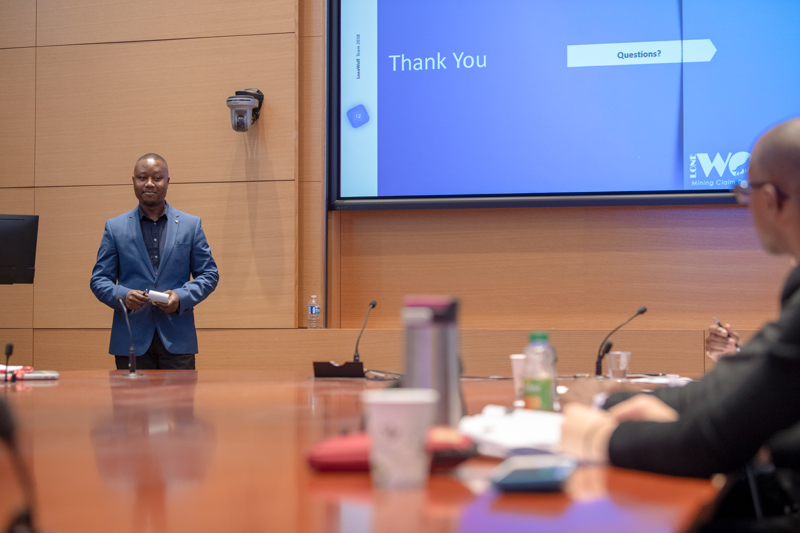
First-ever pitches, second-time students
This year featured the first pitch for a cannabis start-up at U of T Scarborough with Ceto, a company working to produce gourmet, cannabis-infused chocolate.
It is also the first year The Hub has a start-up for Indigenous communities. Hilary Nhiwatiwa, a recent graduate in Geographic Information Science, was inspired after working for an Indigenous organization in Thunder Bay.
A lot of his time was spent going through stacks of records and data on mining, which were on printed pages and created with Excel spreadsheets. Nhiwatiwa set out to create the first technology of its kind — a software specifically designed for Indigenous mining claims. The software is a way to store and search customizable data.
“Mining affects communities in so many different ways, there’s positive and negative aspects so it is a huge deal,” Nhiwatiwa says. “We want to make sure those communities have a tool that will empower them through better communication channels and improved data management.”
This was also the first year that two students entered The Hub for a second time with new businesses. Six years ago, when The Hub first opened its doors, Ravi Ravindran was the first student to approach Graffam with an idea.
Ravindran has recently created BlumeX, a company to help other start-ups produce sales. Start-ups and technology companies of any size can use BlumeX to quickly find experienced people to sell their products.
“When you have a start-up, you’re so focused on building a better product that hiring a sales team takes a lot of time you don’t have,” he says. “By lowering the cost of entering the market, Blumex allows start-ups to punch harder and hit faster.”
Six years of start-ups
Eight groups received all $42,000 of funding, given by Ontario Centres of Excellence and the Provost’s Office at U of T. Though not all groups got funding, they have all been accepted in The Hub.
“The greatest resource of The Hub is the advice we can extend, not just money,” Graffam says.
In its six years at U of T Scarborough, The Hub has helped 111 business ideas take shape, about half of which are still open for business or building their idea.
Of those still open, more than one third have become formally incorporated and six have achieved a valuation of more than $1 million.

